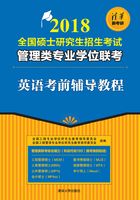
2.1 必须记忆的词缀
一、常见前缀
anti-反抗,反对:anti-corruption(反腐败的), anti-war(反战的)
auto-自己的,自动的:autobiography(自传), ATM(automatic teller machine)
bi-双的:bicycle(双轮的;自行车), bilateral(双边的), biweekly(双周刊)
de-向下,不:decrease(减少), depress(使沮丧;使萧条)
dis-相反:dislike(不喜欢), disadvantage(n.缺点;v.损害)
en-, -en使:dishearten(使气馁), enforce(强迫,执行)
ex-向外:external(外部的), export(出口), express(表达), extroverted(外向的)
im-(动词前缀)向内:import(进口), imprison(入狱), implant(灌输)
im-, in-(形容词前缀)不:impossible(不可能的), impersonal(非个人的),
inter-相互,在内:international((国与国之间的)国际的), internet(互联网)
mal-坏,不良:maltreat(虐待), malnutrition(营养不良), malfunction(故障)
micro-微,微小的:microphone(传声器), microscope(显微镜)
mini-小的:minimum(最小), minibus(小巴), miniskirt(超短裙)
mis-错的:mistake(n.错误;v.误认为), misunderstand(误解)
multi-多的multifunction(多功能), multilevel(多档次的)
non-否定:non-smoking(不抽烟的), nonstop(不断的,不停的)
out-超过,过度:outgrow(过大而不适于), outweigh(过重), outnumber(数量上超过)
over-过度,超:overwork(过劳), overdo(过度,夸张), overflow(溢出,溢流)
post-在……后:postwar(战后的), postmodernism(后现代主义)
pre-在……前:pre-war(战前的), pre-liberation(解放前的)
re-再,重;往后:re-read(再读), re-fill(再装,再填), recess(衰退)
semi-半:semiliterate(半文盲的;知识有限的), semiconductor(半导体)
sub-次的,亚,低于:substandard(次标准的,亚标准的), submarine(潜艇), submerge(下沉,淹没)
trans-转换,横过:transcontinental(横跨大陆的), transform(变换,转换)
un-否定:unknown(无名的), unstable(不稳固的), unhappy
under-在下,不足:underpay(少付工资), underdeveloped(欠发达的), undersized(不够大的)
uni-单一的:unilateral(单边的), uniform(统一的), unique(唯一的,独特的)
二、常见后缀
-able, -ible有能力的:controllable(可控制的), predictable(可预测的)
-age表示状态、性质:wreckage(遭难), shortage(缺乏,不足), leakage(泄漏)
-ant, -ent(能动的)人,物:assistant(助手), agent(代理人), accountant(会计)
-dom性质,状态,行为:kingdom(王国), freedom(自由)
-ee表示动作的接受者:refugee(难民), examinee(应试者), promotee(促销品)
-er, -or表示动作的发出者:examiner(考官), doctor(医生), survivor(生还者)
-ess表示阴性,雌性:hostess(女主人), authoress(女作家), tigress(雌虎)
-hood表示身份、性质:neighborhood(邻里,小区), childhood(孩童时期)
-ify使……化:simplify(简化), beautify(美化)
-ish似……的:childish(孩子气的), girlish(姑娘似的), selfish(自私的)
-ism表示主义,学说:modernism(现代化), tourism(旅游业), fatalism(宿命论)
-ize, -ise, -yze化:modernize(现代化), analyze(分析), realize(实现)
-less不,无,没有:useless(无用的), doubtless(无疑的), careless(粗心的)
-like有……性质的:dreamlike(做梦似的), childlike(孩子似的,天真烂漫的)
-logy学科:biology(生物学), technology(技术)
-ness表示性质、状态:friendliness(友好), kindness(仁慈), selfishness(自私)
-ous, -eous, -ious充满……的:dangerous(危险的), hazardous(危险的), courteous(有礼貌的)
-ward(s)表示方向:seawards(向海地,向海的), eastward(向东的,向东地), inward(向内的,向内地)